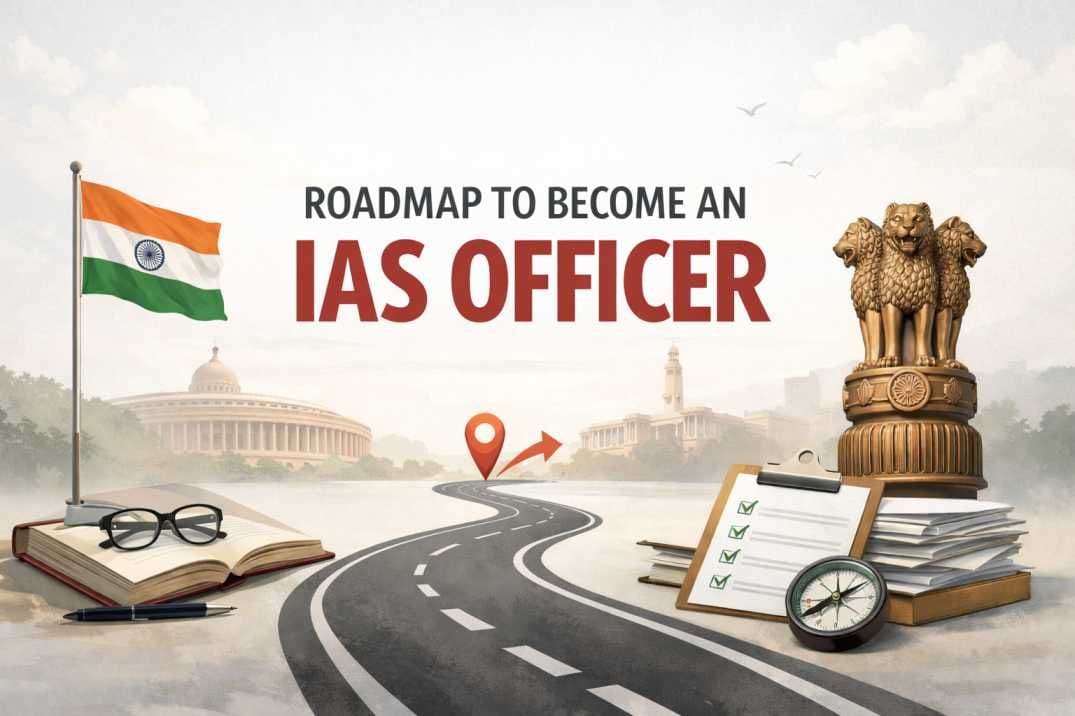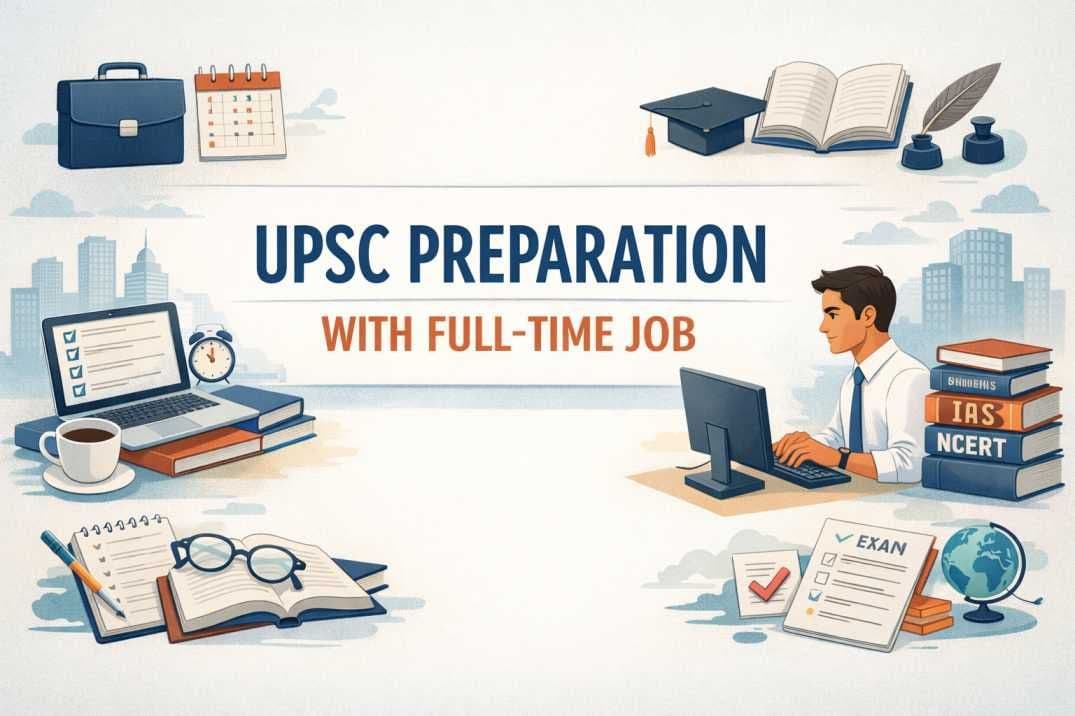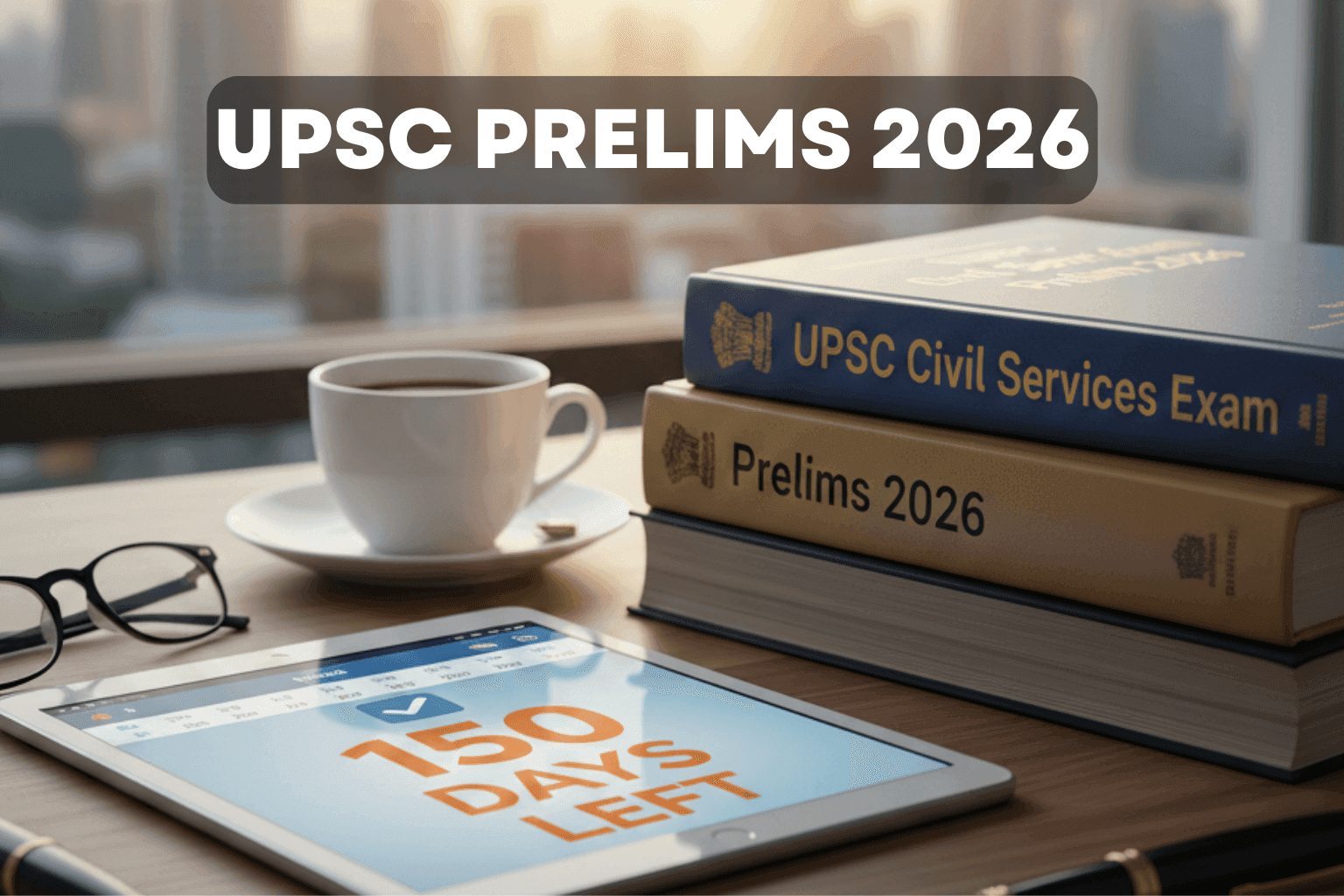Last 20 days strategy for Prelims 2025
Jun, 2025
•4 min read
Introduction
"The last mile is the longest and often the loneliest — but it’s also where finish lines are crossed."
You’re here. 20 days away from one of the most decisive exams of your life — UPSC Prelims 2025. These aren’t just 20 days; they are the bridge between all your hard work and the result you’ve been dreaming of.
Now is not the time to overthink.
It’s time to execute — smartly, efficiently, and confidently.
Let’s dive deep into how you should use each day from now till the exam to maximize retention, boost accuracy, and walk into that hall prepared — not panicked.
Phase 1: Day 1 to Day 10 – Revision is your Brahmastra
Your foundation must be rock solid. These 10 days are for subject-wise revision. That doesn’t mean opening textbooks again — it means revisiting what you’ve already prepared.
Let’s break it down
You need a simple daily system. Every day, aim to revise 2–3 subjects, not more. That way, you give each topic your full focus without rushing through it.
Here’s a suggested pattern:
- Morning Block (2–3 hrs): Subject 1 – Conceptual and static (e.g., Polity, History).
- Afternoon Block (2 hrs): Subject 2 – Application-based (e.g., Economy, Environment).
- Evening Block (2 hrs): Current affairs or PYQ-based revision.
By evening, you’re not exhausted but fulfilled — because every hour was purposeful.
And yes — write things down. Don’t just passively read. Create mini-lists, attempt short quizzes, or explain a topic aloud to yourself. Passive revision fades. Active revision sticks.
📚 Subject-Wise Guidance:
🏛️ Polity
This is your best friend in Prelims. The UPSC loves framing questions that look easy but twist basic facts.
👉 Focus on:
- The differences between similar constitutional bodies (like CAG vs CVC, EC vs UPSC).
- Powers of President vs Governor.
- Emergency provisions, fundamental rights, DPSPs.
👉 What to do:
- Revise from your own notes or Laxmikanth summaries.
- Keep a cheat sheet of important Articles (yes, make one if you haven’t yet).
- Solve PYQs to see how “straightforward” questions often contain traps.
✨ Pro Tip: If a concept feels familiar but you can’t explain it in your own words — revisit it. Familiarity is not understanding.

💸 Economy
The economy can either empower you or leave you dazed. It’s not about remembering random schemes — it’s about understanding how the economy works.
👉 Focus on:
- Core concepts: Inflation, fiscal deficit, monetary tools (like repo rate), balance of payments.
- Budget 2024-25 and Economic Survey summaries
- Banking and finance-related current affairs: UPI, digital currency, RBI updates.
👉 What to do:
- Go through your static notes first — build a strong conceptual base.
- Then link current events to those basics (e.g., how repo rate cuts impact inflation).
- Revise government schemes only if they were frequently in the news — don’t go overboard.
🌿 Environment & Ecology
This is a high-return area. UPSC often frames direct factual questions here.
👉 Focus on:
- Biosphere reserves, National Parks, Tiger Reserves – location + features.
- Conventions: CITES, Ramsar, UNFCCC, CBD — their full forms, objectives, and relevance.
- IUCN statuses of major species (especially those recently in news).
- Static ecology concepts: food chains, biodiversity, eco-sensitivity.
👉 What to do:
- Create maps and location lists for protected areas.
- Revise your environment fact file or notes — don’t read books now.
- Supplement with 10–15 questions daily from previous Prelims or mocks.
✨ Tip: Environment has overlap with current affairs. Keep both lenses open.
📜 Modern History
Your preparation is likely based on Spectrum. That’s great — now it’s time to trim the fat and absorb the core.
👉 Focus on:
- The timeline: From 1857 to 1947 — events, causes, consequences.
- Personalities: Match their ideologies, journals, and movements.
- Congress sessions, constitutional acts, Gandhian movements.
👉 What to do:
- Use short notes, not the full Spectrum book now.
- Revisit PYQs — many questions are repeated or twisted versions of earlier ones.
- Create a “cheat sheet” for Acts and Congress sessions (dates + outcomes).

🎨 Art & Culture
This section often feels unpredictable — and that’s true. But it doesn’t mean you go in blind.
👉 Focus on:
- Dance forms, musical instruments, temple architecture styles.
- Buddhism & Jainism — symbols, councils, sects.
- UNESCO heritage sites — why they were selected.
👉 What to do:
- Use mind maps and one-pagers — visuals help retain this area.
- Don’t aim to master Art & Culture now — aim to cover the important basics.
🗺️ Geography
UPSC loves to ask map-based and location-specific questions.
👉 Focus on:
- Indian rivers, mountains, states with borders, mineral belts.
- Soils, agro-climatic zones, climatic phenomena (e.g., El Niño, monsoons).
- Basics of geomorphology (plate tectonics, types of rocks, etc.).
👉 What to do:
- Practice locating 10 things daily on a blank map.
- Keep sticky notes for tricky concepts like jet streams, cyclones, etc.
- Do not go back to GC Leong or NCERTs — just revise what you already know.
🌐 Current Affairs
This is NOT the time to read 12 PDFs or 5 toppers’ notes. Now is the time to revise your compiled source — and stick to it.
👉 Focus on:
- Government schemes (especially welfare, agriculture, infra, health, digital).
- International reports, organizations, summits (who releases what, themes).
- Science & tech: ISRO, AI, quantum tech, defense in news.
- Recent judgments, policies, and important personalities.
👉 What to do:
- Break it by theme, not month: e.g., “Govt Schemes Day”, “Science in News Day”.
- Create a “Last Mile” folder — highlight only what you can revise again in the last 3 days.
Phase 2: Day 11 to Day 17 – Refinement & Retention
This is the most critical window. The initial chaos is over; now, fine-tune your strategy.
✅ What You Should Do:
- Focus now on mistake-prone areas - topics where you make most of your mistakes.
- Revisit your mock test error notebook - keep an eye on mistakes that you made, why did you make them and how are you going to fix them.
- Attempt 3–4 high-quality CSAT tests - this is most important. We will discuss why in a few minutes.
- Practice mental elimination techniques daily.
🧠 Smart Technique: Brain Dump
- Every evening, take a blank paper and try to write down key facts without looking at notes — articles in polity, important schemes, tiger reserves, budget numbers. This helps convert passive reading into active recall, which is exactly what the exam demands.
CSAT: Don’t Let It Surprise You
Many serious aspirants fall here because they think, “CSAT toh ho hi jaayega.”
But the paper is unpredictable. You must practice with real mocks:
- Solve 5 full CSAT papers in the next 20 days, including PYQ test.
- Identify which of the three is your weak link: Quant, Reasoning, or Comprehension.
- If it’s comprehension: Practice 4–5 RCs daily.
- If it’s quant: Time-bound solving of previous year quant questions.
- Build a solid strategy of paper solving- which part are you going to attempt first and what will be your strong game.
Even if you're strong in CSAT, don't be overconfident. Treat it with the respect it deserves.
Phase 3: Day 18 to 20 – Settle the Mind, Trust the Process
These final three days are about conserving energy, reinforcing confidence, and avoiding chaos. You’re not preparing anymore — you’re stabilizing.
“A calm mind is a weapon. In the chaos of battle, clarity is power.”
📆 Day 18: Focused Final Revisions
- Revise only core, high-yield areas: Polity, Environment, Economy, and Current Affairs.
- Stick to your own short notes, one-pagers, or mind maps.
- Revisit tricky areas you've often mixed up — species IUCN status, Articles, schemes.
- Avoid multiple subjects — revise just 2–3 themes well, not everything.
📆 Day 19: Touch-ups & Mental Clarity
- Skim through maps, schemes, important facts, and static summaries.
- Go through your “frequently forgotten” list or flashcards.
- Focus more on clarity than coverage — don’t push yourself for volume.
- Wind up revision by early evening. Don’t overstimulate the brain.
📆 Day 20: Full Reset Mode
- No heavy studying today. Just flip through 1–2 pages of personal notes if you must.
- Eat light, hydrate well, walk a little, and keep devices/screen time minimal.
- Pack your bag, double-check your admit card & essentials.
- Sleep early, even if you're slightly anxious — rest > revision now.
Final Thoughts: Will I Clear Prelims?
If you’ve read till here, chances are — you’ve done more than you think.
Prelims doesn’t ask for perfection. It rewards clarity, calmness, and control.
You still have time to:
- Fix silly errors.
- Boost your confidence.
- Sharpen your instincts.
- Improve your CSAT.
- And most importantly, build belief.
On May 25th, walk into that exam hall knowing you’ve prepared not just with your books — but with strategy, grit, and wisdom.
All the best 🙂


